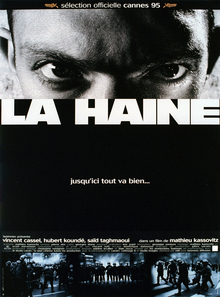 |
| Vincent Cassel and Emmanuelle Devos in Read My Lips |
Cast: Emmanuelle Devos, Vincent Cassel, Olivier Gourmet, Olivier Perrier, Olivia Bonamy, Bernard Alane, Céline Samie, Pierre Diot, François Loriquet, Serge Onteniente, David Saracino, Christophe Vandevelde. Screenplay: Jacques Audiard, Tonino Benacquista. Cinematography: Mathieu Vadepied. Production design: Michel Barthélémy. Film editing: Juliette Welfling. Music: Alexandre Desplat.
It's so easy to imagine an American remake of Jacques Audard's Read My Lips that it's surprising it hasn't been done with, say, Emma Stone and Ryan Gosling in the roles played by Emmanuelle Devos and Vincent Cassel. At its core it's a romantic thriller about a mousy office worker who blossoms when she teams up with a scruffy ex-con for a heist that depends in large part on her ability to read lips. But this is the French version, so it's also violent and murky, with some complicated backstories and sidebar episodes. Devos plays Carla, an overworked secretary/office manager with a hearing impairment, who collapses one day after being harassed once too often by other members of the staff. Her boss takes notice, however, and lets her hire an assistant to do some of the grunt work like photocopying. The hire is Paul (Cassel), who has just got out of prison, and Carla is so grateful for what he does -- and so obviously turned on by his rough masculinity -- that she goes out of her way to help him find a place to live and even gives him money. Paul repays her by helping her get even with one of the office harassers, but he still owes money to Marchand (OIivier Gourmet), one of his old criminal associates. That's where Carla's ability to lip-read comes in. So Carla and Paul team up to rob a large amount of money that Marchand is holding for some fellow criminals. Read My Lips was well received, winning César awards for Devos and for the screenplay, and nominations for Cassel, Audiard's direction, and for best film. But it also has some detractors, who criticize it as overlong and needlessly complicated, including a subplot involving Paul's parole office (Olivier Perrier) that seems to have nothing to do with the main plot. The treatment of Carla's hearing impairment is vague, and some have questioned whether even the most skilled lip-readers could do what the film has her do. But Devos and Cassel are terrific, generating real sexual tension, and Audiard skillfully provides suspense and surprises.




